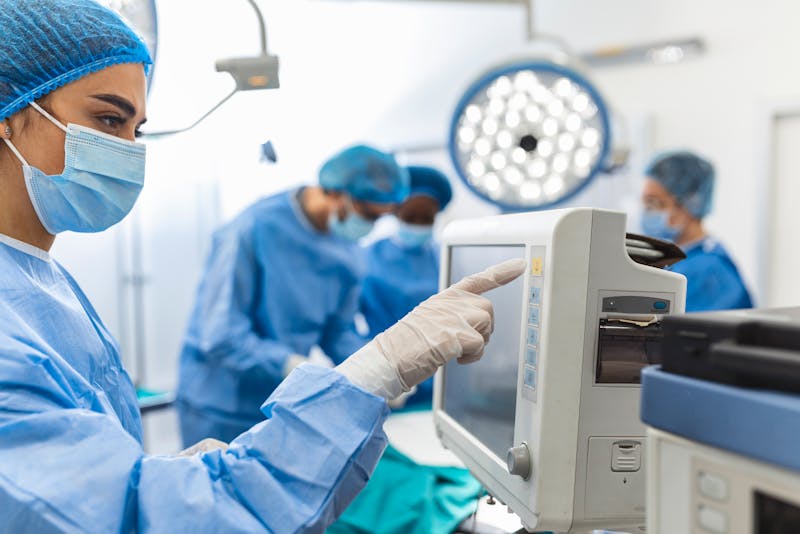
Recently Dr. Lampert was featured on WUSF News read the original article with an audio clip here.
In Search Of Ventilators, Florida Looks At Surgery Centers
As Florida prepares for a surge in COVID-19 cases the state is reaching out to ambulatory surgery centers for possible help.
The state’s emergency operations center sent surveys to these facilities asking about resources and capacity to support an increased demand for medical care due to the virus. The survey included questions about anesthesia machines, which can be used in place of much-needed ventilators for COVID-19 patients.
Ambulatory surgery centers (ASC’s) provide same-day care for surgeries that don’t require extended recovery and for other procedures that may require sedation like colonoscopies. There are hundreds across the state.
Dr. Joshua Lampert, who runs an ambulatory surgery center in Miami, said he received the survey on April 5 with a request for a rapid response by noon the next day.
“To be honest, I’m really not surprised,” he said. “As we’re kind of moving closer to what we potentially think will be the peak down here in Florida, it makes sense that the state will want to take inventory of anesthesia machines should they run out of ventilators at the hospital.”
Lampert explained both ventilators and anesthesia machines provide respiratory support to patients and help them breathe. But there are differences between the two.
He said modern ventilators commonly found in hospital intensive care units can provide respiratory support for extended periods of time whereas anesthesia machines were not designed for long-term ventilation. That doesn’t necessarily mean they can’t, but the machines will require more attention and maintenance.
In general Lampert said an anesthesia machine requires much more monitoring than ventilators.
“It’s designed in mind that the anesthesiologist is going to be essentially sitting in front of the machine the entire time watching the monitor, watching the patient,” he said. “So ideally, in an ICU, they would be relying on ventilators. But if they did run out of ventilators, then potentially an anesthesia machine could provide similar support but would require a little more hands-on (work) with the physician that’s running it.”
Using these machines as ventilators is considered “off-label use,” meaning it’s normally not FDA-approved. But the administration made an exception last month to respond to shortages in medical supplies due to the pandemic.
The brief survey also included questions about whether ambulatory surgery centers had already integrated with a hospital system to help support COVID-19 response and the contact information for biomedical technicians who work there.
Lampert said he runs a small facility with one operating room and two recovery bays and is not affiliated with a hospital.
He said many ASC’s have had to close or reduce their hours since Gov. Ron DeSantis temporarily barred elective surgeries to respond to the outbreak. His is still operating, but in a limited capacity.
“Overall our volume is down significantly because probably at least 50% of my practice normally is cosmetic surgery,” Lampert said. “But I’m also doing some traumatic injuries, such as broken noses, dog bites, lacerations. Those are the things that we’re currently treating and right now, I think my ambulatory surgery center is serving the community best that way.”
“If it gets to a point where our anesthesia machine would better serve the community and save lives, then, you know, that would be something that potentially we would donate or whatever would be the best possible outcome.”
Lampert said there are questions about how and when ASC’s would get their anesthesia machines back, which he said can cost “as much as a small BMW.”
As for whether his facility could potentially switch gears to directly get involved in COVID-19 response if hospitals are overrun, Lampert doesn’t think it would make sense.
“Our facility I feel would be too small to turn into a, you know, triage station for COVID-19 patients, but there are larger facilities that have multiple operating rooms and multiple recovery bays where they could potentially become an extension of the hospital or something like that,” he explained.
Lampert said he hasn’t heard anything from the state in terms of follow-up about the survey and thinks for now at least, emergency officials are just trying to get a sense of what is out there.
He suggested the state also survey office-based surgical practices for an expanded supply of anesthesia machines.
The state emergency operations center has yet to respond to a request for comment about the survey and whether other health facilities are also being questioned about their resources.
WUSF 89.7 depends on donors for the funding it takes to provide you the most trusted source of news and information here in town, across our state, and around the world. Support WUSF now by giving monthly, or make a one-time donation online.

